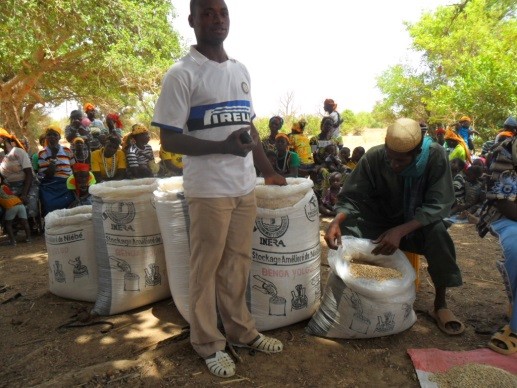
In Burkina Faso, thousands of hungry families are more food secure thanks to a new technique for storing product that is increasing post-harvest quantity and quality and raising farmers' incomes.
Fifty percent of households in Burkina Faso are chronically food insecure. With over 80 percent of the population working in agriculture, more productive harvests can have a large impact on vulnerable families.
A USAID program implemented by Catholic Relief Services emphasizes the importance of using improved agricultural practices to increase revenues for vulnerable, food-insecure families. One of these techniques is the use of triple-lined sacks.
Since the program’s launch in 2010, over 18,600 farmers have been using the sacks. Profits have doubled for many of the farmers, who are now able to store their cowpea production for at least six months after the harvest. The sacks increase storage time without pesticides and allow farmers to sell goods when prices are higher. For example, cowpea prices in Gayeri health district increased from 50 cents a kilogram during the harvest season in October 2012 to $1 a kilogram in February-April 2013.
“This is my third year of using the triple-lined bags, and they are very effective. I kept my stock of cowpeas long enough and sold it when prices were high on the market,” says Thiombiano Toumbendi, a farmer from Gayeri.
Not only do the sacks increase storage time, but their well-built design also improves food quality and safety.
“When I opened the triple-lined bags some six months later, I was very pleased to notice that my stock of cowpeas was intact, as fresh looking as when I bagged it at harvest in October,” observes Ouoba Kampari, another program beneficiary from the Kpenkatougou village.
With storage no longer an issue, farmers such as Thiombiano and Kampari have significantly increased their cowpea production. With the profits from higher cowpea prices, they are able to turn to other income-generating activities.
“I reinvested the benefits into sheep fattening, which will give me more money to buy more cowpeas,” explains Toumbendi.
And while farmers have traditionally resorted to using chemicals to reduce insect infestation, triple-lined sacks have eliminated the need for chemicals to protect the food. Environmentally sound techniques like the sacks are reducing health risks while raising profits for vulnerable families in Burkina Faso.
“Prior to [the bags'] promotion in our area, we used chemical products to preserve the cowpeas. Not only did the practice present health risks, but we still observed infestation during the storage,” says Toumbendi.
Locally manufactured by a company in Ouagadougou, triple-lined bags will eventually become part of a larger supply chain. The project is working to link farmers to established agricultural inputs providers. As a result, many farmers are starting to buy their triple-lined sacks directly from local merchant distributors who sell the sacks in markets and in the surrounding villages.
Since the program began, over 33,000 Burkinabé households have increased their agricultural productivity, leading to an improvement in their food availability and overall food security.
USAID's $38 million, five-year Families Achieving Sustainable Outcomes program is designed to improve access to quality food throughout the year for vulnerable households in Burkina Faso. Spanning 2010-2015, the program targets over 58,000 households in three health districts of the northern and eastern regions of the country.







Comment
Make a general inquiry or suggest an improvement.